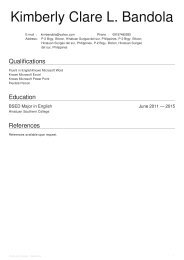gilgamesh - Copy
You also want an ePaper? Increase the reach of your titles
YUMPU automatically turns print PDFs into web optimized ePapers that Google loves.
The Epic Of Gilgamesh<br />
GILGAMESH: The hero of the Epic; son of the goddess Ninsun and of a priest of Kullab, fifth king of Uruk<br />
after the flood, famous as a great builder and as a judge of the dead. A cycle of epic poems has collected round his<br />
name.<br />
HANISH: A divine herald of storm and bad weather.<br />
HUMBABA: Also Huwawa; a guardian of the cedar forest who opposes Gilgamesh and is killed by him and<br />
Enkidu. A nature divinity, perhaps an Anatolian, Elamite, or Syrian god. See p. 32.<br />
IGIGI: Collective name for the great gods of heaven.<br />
IRKALLA: Another name for Ereshkigal; the Queen of the underworld.<br />
ISHTAR: Sumerian Inanna; the goddess of love and fertility, also goddess of war, called the Queen of Heaven.<br />
She is the daughter of Anu and patroness of Uruk, where she has a temple. See p. 25.<br />
ISHULLANA: The: gardener of Anu, once loved by Ishtar whom he rejected; he was turned by her into a mole<br />
or frog.<br />
KI: The earth.<br />
KULLAS:Part of Uruk.<br />
LUGULEANDA: Third king of the post-diluvian dynasty of Uruk, a god and shepherd, and hero of a cycle of<br />
Sumerian poems; protector of Gilgamesh.<br />
MAGAN: A land to the west of Mesopotamia, sometimes Egypt or Arabia, and sometimes the land of the<br />
dead, the underworld:<br />
MAGILUM: Uncertain meaning, perhaps ‘the boat of the dead'.<br />
MAMMETUM: Ancestral goddess responsible for destinies.<br />
MAN-SCORPION: Guardian, with a similar female monster, of the mountain into which the sun descends at<br />
nightfall. Shown on sealings and ivory inlays as a figure with the upper part of the body human and the lower part<br />
ending in a scorpion's mil. According to the Enuma Elish created by the primeval waters in order to fight the gods.<br />
MASHU: The word means 'twins' in the Akkadian language. A mountain with twin peaks into which the sun<br />
descends at nightfall and from which it returns at dawn. Sometimes thought of as Lebanon and Anti-Lebanon.<br />
NAMTAR: Fate, destiny in its evil aspect; pictured as a demon of the underworld, also a messenger and chief<br />
minister of Ereshkigal; a bringer of disease and pestilence.<br />
NEDU: See Ned.<br />
NERGAL: Underworld god, sometimes the husband of Ereshkigal, he is the subject of an Akkadian poem<br />
which describes his translation from heaven to the underworld; plague-god.<br />
NETI: The Sumerian form of Nedu, the chief gatekeeper in the<br />
underworld.<br />
NINDUKUGGA: With Endukugga, parental gods living in the underworld:<br />
NINGAL: Wife of the Moon God and mother of the Sun.<br />
NINGIESU: An earlier form of Ninurta; god of irrigation and fertility, he had a field near Lagash where all<br />
sorts of plants flourished; he was the child of a she-goat.<br />
NINGIZZIDA: Also Gizzida; a fertility god, addressed as 'Lord of the Tree of Life'; sometimes he is a serpent<br />
with human head, but later he was a god of healing and magic; the companion of Tammuz, with whom he stood at<br />
the gate of heaven.<br />
NINHURSAG: Sumerian mother-goddess; one of the four principal Sumerian gods with An, Enlil, and Enki;<br />
sometimes the wife of Enki, she created all vegetation. The name means 'the Mother'; she is also called 'Nintu', lady<br />
of birth, and IG, the earth.<br />
NINKI: The 'mother' of Enlil, probably a form of Ninhursag.<br />
NINLIL: Goddess of heaven, earth, and air and in one aspect of the underworld; wife of Enlil and mother of<br />
the Moon; worshipped with Enlil in Nippur.<br />
NINSUM The mother of Gilgamesh, a minor goddess whose house was in Uruk; she was noted for wisdom,<br />
and was the wife of Lugulbaada.<br />
NINURTA: The later forth of Ningirsu; a warrior and god of war, a herald, the south wind, and god of wells<br />
and irrigation. According to one poem he once dammed up the bitter waters of the underworld and conquered<br />
various monsters.<br />
NISABA: Goddess of grain.<br />
NISIR: Probably means 'Mountain of Salvation'; sometimes identified with the Pir Oman Gudrun range south .<br />
of the lower Zab, or with the biblical Ararat north of Lake Van.<br />
PUZUR-AMURRI: The steersman of Utnapishtim during the flood.<br />
SAMUQAN: God of cattle;<br />
SEVEN SAGES: Wise men who brought civilization to the seven oldest cities of Mesopotamia.<br />
26



